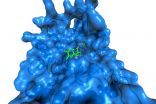Moreover, treatment with melatonin improved clinical symptoms in a mouse model of multiple sclerosis by restoring a healthy balance of immune cells called T lymphocytes. The findings, which resulted from a collaboration between American and Argentinian scientists, could potentially lead to the development of novel treatments for a broad range of autoimmune disorders.
"Our work may provide an answer for the seasonal paradox by identifying melatonin, whose levels are regulated by seasonal fluctuations in day length, as an additional regulator of the immune response in multiple sclerosis," says study author Francisco J. Quintanta of the Ann Romney Center for Neurologic Diseases at Brigham and Women's Hospital and Harvard Medical School. "The implication is that molecules activating melatonin signaling may represent new targets for therapeutic immunomodulation in multiple sclerosis and potentially other inflammatory diseases."
Multiple sclerosis is a nervous system disorder thought to be triggered by T cells that destroy the myelin sheath--the material that surrounds and protects nerve cells. This damage slows down or blocks messages between the brain and the body, leading to symptoms such as visual disturbances, muscle weakness, trouble with coordination and balance, and thinking and memory problems. In addition to genetic factors, the disease is influenced by environmental factors such as infections, sodium intake, smoking, and vitamin D levels.
In particular, vitamin D has been considered as a factor that could potentially contribute to the seasonal flare-ups that have been observed in patients with multiple sclerosis for decades. Not only does the vitamin affect immune responses, but its synthesis is triggered by sun exposure and exhibits large seasonal fluctuations. However, these observations pose a paradox: vitamin D is expected to reduce the frequency of relapses in the spring and summer due to its anti-inflammatory effects, but that's exactly when clinical symptoms are at their worst.
To solve this seasonal paradox, Quintana and study authors Mauricio Farez and Jorge Correale of the Raúl Carrea Institute for Neurological Research (FLENI) in Argentina set out to identify additional environmental factors that could play a role. They quickly zeroed in on melatonin because levels of the hormone, which regulates circadian rhythms and immune responses, fluctuate with the seasons.
In support of this idea, the researchers discovered a negative relationship between melatonin levels and clinical relapses in 139 patients with multiple sclerosis. Because melatonin production is stimulated by darkness, levels of the hormone peaked in the fall and winter. Meanwhile, there was a 32% reduction in the number of relapses in the fall and winter compared to the spring and summer. The findings demonstrate that higher melatonin levels in the darker months are associated with an improvement in clinical symptoms.
To test if melatonin plays a causal role in relapses, the researchers gave daily injections of the hormone to mice with an autoimmune disease that recapitulates key features of multiple sclerosis. Not only did melatonin treatment improve clinical symptoms, it also restored a healthy balance of T cells in the brain, spinal cord, and several immune organs. The hormone reduced levels of harmful T cells called Th17 cells, which are known to play a major role in the development of multiple sclerosis. At the same time, melatonin treatment stimulated an increase in regulatory T cells, which keep Th17 activity in check.
"The main strength of the study is that we demonstrate with great detail the mechanisms used by melatonin to modulate the immune system. In addition to this, we show the effects of melatonin in an animal model of multiple sclerosis, human cells and patients, connecting basic research with clinical work," Farez says. "Nonetheless, our work is entirely based in patients from one particular setting and location--Buenos Aires, Argentina--and further work in other centers and with larger cohorts should be done to confirm and extend our findings in other regions with genetically distinct populations."
Because melatonin exerted its effects on T cells by activating pathways previously implicated in inflammatory bowel disease and autoimmune colitis, the same mechanisms may play a role in a broad range of autoimmune disorders. Moreover, seasonal flare-ups have also been observed in patients with lupus and rheumatoid arthritis, hinting at broader possible implications of the study. "Several melatonin-derived drugs have been used or tested in humans for other conditions such as insomnia," Farez says. "These drugs could potentially be repurposed to modulate inflammation in multiple sclerosis and other inflammatory conditions."
The researchers are currently working on a pilot clinical trial to study the effect of targeting melatonin signaling in patients with multiple sclerosis. They are also investigating additional mechanisms of action and examining whether low melatonin levels increase the risk of developing the disease. Although the findings provide strong basic and epidemiological evidence for the role of melatonin in the seasonality of multiple sclerosis flare-ups, the interplay between melatonin and other well-recognized seasonal factors such as vitamin D remains to be seen.
"In the future, melatonin or its derivatives may be used in patients with multiple sclerosis after appropriate clinical trials are conducted," Quintana says. "However, extreme caution should be exercised because our data do not show that melatonin or its analogs are effective in treating multiple sclerosis. Until a clinical trial is conducted and an appropriate drug and dosage is established, it is not recommended to use melatonin for the treatment of multiple sclerosis."
INFORMATION:
This study was supported by the Allende Foundation, the Multiple Sclerosis International Federation, Biogen Idec, Novartis Argentina, Merck Serono Argentina, the National Institutes of Health, the National Multiple Sclerosis Society, and the International Progressive MS Alliance.
Cell, Farez et al.: "Melatonin Contributes to the Seasonality of Multiple Sclerosis Relapses" http://dx.doi.org/10.1016/j.cell.2015.08.025
Cell, the flagship journal of Cell Press, is a bimonthly journal that publishes findings of unusual significance in any area of experimental biology, including but not limited to cell biology, molecular biology, neuroscience, immunology, virology and microbiology, cancer, human genetics, systems biology, signaling, and disease mechanisms and therapeutics. For more information, please visit http://www.cell.com/cell. To receive media alerts for Cell or other Cell Press journals, contact press@cell.com.

